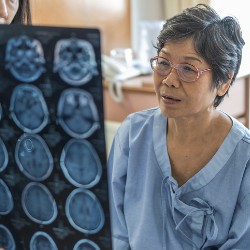CTSI Fostered Development of Drug that Extends Effectiveness of HIV Therapy
Former CTSI Incubator recipient, Harris “Handy” Gelbard, M.D., Ph.D., has developed a drug that extends the effectiveness of several HIV therapies. URMC-099, a drug originally designed to treat HIV associated dementia, showed a surprising added bonus: it allowed HIV drugs to stay in the system longer and aided removal of the virus from cells.
The study, published in the Journal of Clinical Investigation, was born out of research once funded by the CTSI Incubator grant program, in addition to funding from the NIH. In 2011, Gelbard, professor and director of the University of Rochester’s Center for Neural Development and Disease, was among the first group of researchers at UR to receive a CTSI Incubator grant. The project, led by Burns C. Blaxall, Ph.D., director of Translational Science at Cincinnati Children’s Hospital Heart Institute, focused on URMC-099’s ability to halt progression of HIV associated dementia and heart failure by reducing inflammation, a hallmark of both diseases.
Previous work, funded in part by the CTSI Incubator, showed that URMC-099 protected mice from HIV associated inflammation and brain damage, but Gelbard had to ensure that his drug would not interfere with antiretroviral drugs taken by HIV patients every day to slow virus production. Surprisingly, URMC-099 did the exactly opposite: it gave HIV drugs a boost.

When used in combination with two different “nanoformulated” antiretroviral drugs made by Gelbard’s collaborator, Howard Gendelman, M.D., from the University of Nebraska Medical Center, URMC-099 restored human immune cells’ ability to get rid of cellular garbage, like viruses, by a process called autophagy. HIV inhibits autophagy to help sustain itself, but URMC-099 lifts the brake, allowing cells to digest any virus remaining after antiretroviral therapy, keeping cells virus-free longer.
For reasons yet to be determined, reinstating autophagy also allowed the antiretroviral drugs to stay in the cells up to 50 times longer, which Gelbard hopes could eliminate the need for HIV patients to take medications every day. Removing that burden would make it much easier for patients to comply with their care and stay healthy.
Gelbard and his team will continue these studies and hope to develop a long-acting HIV therapy containing URMC-099 and a nanoformulated antiretroviral that can be mobilized for human use in the next 5 years.
Read more about this new finding.
Learn more about the 2011 CTSI Incubator project.
Michael Hazard | 2/3/2017



